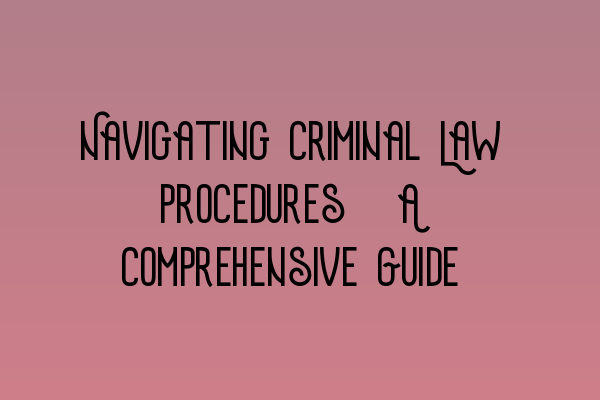Navigating Criminal Law Procedures: A Comprehensive Guide
Welcome to SQE Criminal Law & Practice Law UK, where we provide expert legal advice and guidance to help you navigate the complexities of criminal law procedures. Whether you are a solicitor, law student, or someone seeking information on criminal law, this comprehensive guide will equip you with the knowledge and understanding you need to navigate the criminal justice system.
Understanding Criminal Law Procedures
If you are involved in a criminal case, it is crucial to understand the various stages and procedures that make up the criminal law process. From the initial arrest to trial and potential appeals, each stage has its own set of rules and requirements. Our goal is to simplify these procedures and provide you with valuable insights to help you navigate them effectively.
One of the first steps in understanding criminal law procedures is to grasp the basics of criminal law itself. Criminal law covers a wide range of offenses, from minor misdemeanors to serious felonies. Familiarizing yourself with the different types of crimes and their legal definitions is essential. Our SQE 2 Preparation Courses delve into the intricacies of criminal law, offering in-depth knowledge and practical examples to enhance your understanding.
The Criminal Justice System: An Overview
Before diving into the specific procedures, it is important to have an overview of the criminal justice system as a whole. From reporting a crime to the police to sentencing and rehabilitation, the criminal justice system plays a crucial role in maintaining law and order in society.
In our SQE 1 Practice Exam Questions and SQE 1 Practice Mocks FLK1 FLK2, we address the fundamental principles of criminal justice. By familiarizing yourself with these principles, you can gain a deeper understanding of the procedures that follow and how they contribute to the administration of justice.
Key Stages and Procedures
Now that you have a solid foundation of criminal law and an overview of the criminal justice system, let’s explore the key stages and procedures involved in a criminal case. It is important to note that the exact procedures may vary depending on the jurisdiction and the nature of the crime.
1. Arrest and Detention: When a person is suspected of committing a crime, the police have the authority to arrest and detain them. This stage involves the gathering of evidence, questioning of the suspect, and determining whether there are grounds for further legal action. To learn more about this stage, check out our article on SRA SQE Exam Dates.
2. Charging: Once the police have gathered sufficient evidence, they may charge the suspect with a specific offense. This is the formal accusation against the individual and marks the beginning of the court proceedings. Our SQE 1 Preparation Courses provide comprehensive guidance on how to navigate this stage effectively.
3. Bail: After being charged, the court may grant the suspect bail, allowing them to be released from custody until their trial. Understanding the factors that influence bail decisions and the conditions imposed is important during this stage.
4. Pre-trial Procedures: Several important procedures take place before the trial, including case management hearings, disclosure of evidence, and plea negotiations. These actions shape the course of the trial and require careful attention to detail.
5. Trial: The trial stage is where evidence is presented, witnesses are called, and arguments are made by both the prosecution and the defense. Understanding the trial process, including the examination and cross-examination of witnesses, is crucial to effectively represent your client.
6. Sentencing: If the defendant is found guilty or pleads guilty, the court will impose a suitable sentence. Sentencing considerations include the seriousness of the offense, previous criminal history, and any mitigating factors. Being familiar with sentencing guidelines and principles is essential in this stage.
7. Appeals: In certain circumstances, the convicted individual or the prosecution may choose to appeal the court’s decision. This stage involves challenging the legal basis of the conviction or the appropriateness of the sentence imposed.
Conclusion
Navigating criminal law procedures can be complex and demanding, but with the right knowledge and guidance, you can effectively represent your clients and navigate the justice system with confidence. At SQE Criminal Law & Practice Law UK, we strive to provide comprehensive resources and courses to enhance your understanding of criminal law procedures. Whether you are preparing for the SQE exams or seeking practical advice as a practicing solicitor, our expert team is here to support you every step of the way.
For more information on criminal law procedures, check out our related articles:
- SQE 1 Practice Exam Questions
- SQE 1 Practice Mocks FLK1 FLK2
- SQE 2 Preparation Courses
- SQE 1 Preparation Courses
- SRA SQE Exam Dates
